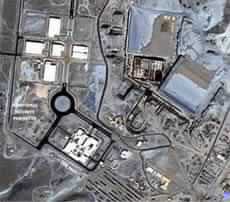- Author:
& Agencies - Section:
WORLD HEADLINES
U.S. Pushes for U.N. Action Against Iran

Concerned that Iran may be running a nuclear weapons program, the United States is pushing for U.N. action against Tehran, diplomats said Thursday. Washington is specifically seeking a declaration from the board of the International Atomic Energy Agency that Iran has violated the nuclear Nonproliferation Treaty, which it has signed, according to diplomats familiar with the agency.
The United States has accused Iran of secretly embarking on a program to enrich uranium at Natanz in southern Iran, which American officials fear could be used to make nuclear weapons.
The diplomats said U.S. requests for support have gone out to Russia, France, Britain, Germany and other members of the 35-nation board - the key decision-maker at the U.N. nuclear watchdog agency - ahead of its meeting next month.
The diplomats were confirming a report in Thursday's editions of The New York Times.
Britain, Washington's closest ally, suggested Thursday that it was receptive to the U.S. overtures.
"We share U.S. concerns about the scale and scope of the Iranian nuclear program," said a spokeswoman for Britain's Foreign Office in London, speaking on customary condition of anonymity. "We'll be listening carefully to the (IAEA) director-general's report at the next board meeting."
A declaration, depending on its language, could restrict itself to expressing concern about a violation or increase pressure on Tehran to account for its activities by referring the issue to the Security Council.
That would further strain U.S.-Iranian relations, which took a turn for the worse last year after President Bush labeled Tehran part of the "Axis of Evil" for its alleged support of terrorism.
More recently, Tehran has said it would not recognize any U.S.-installed government in Iraq. And Washington signed a truce with the People's Mujahedeen, which opposes the Tehran government, allowing it to keep its weapons although the Iraqi-based group is on the State Department's terrorist list.
The nature of work at the Natanz site was not known until last year. The diplomats, who spoke on condition of anonymity, said Mohamed Baradei, director-general of the Vienna-based IAEA, was taken aback at what he saw on a visit there in February.
"It's a sophisticated uranium enrichment plant, and they had come a long way," said one diplomat familiar with the findings of the visit and the workings of the agency. "He was struck by the sophistication and the advanced stage of the project."
The diplomat said U.S. officials "want the agency to produce a very critical report" at the board meeting.
An agency spokeswoman, Melissa Fleming, said it was too early to comment on the Iranian program and whether Tehran had violated its treaty commitments.
Members of the U.S. delegation to the IAEA declined comment.
With Russia's nuclear cooperation with Iran being criticized by Washington, it was unclear how willing Moscow would be to back a tough resolution.
The United States claims that the technology and expertise Iran is gaining from Russia's construction of the 800 million US dollars Bushehr nuclear power plant could be used for a weapons program, and that Russian companies - perhaps without official permission - have transferred weapons technology to Tehran.
Senior Russian officials earlier this week said there was no evidence Iran was pursuing nuclear weapons, while acknowledging that Tehran had to show more transparency in its nuclear programs.
A top Iranian official on Tuesday denied his country had a nuclear weapons program but told the IAEA his country would not automatically submit to tougher inspections. Iranian officials have said they have nothing to hide because their nuclear program is only meant to generate electricity.
**PHOTO CAPTION***
Iran said on May 7, 2003 that it expected to receive a clean bill of health from the International Atomic Energy Agency (IAEA) next month despite U.S. accusations that it is in breach of a key treaty on nuclear weapons. A close up from a September 16, 2002 satellite image shows facilities in Natanz, Iran believed to be part of a previously unknown segment of Iran's nuclear program. Photo by Isis, Digitalglobe/Reuters


 Home
Home Discover Islam
Discover Islam Quran Recitations
Quran Recitations Lectures
Lectures
 Fatwa
Fatwa Articles
Articles Fiqh
Fiqh E-Books
E-Books Boys & Girls
Boys & Girls  Women
Women









